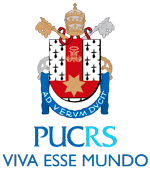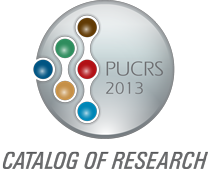Foreword
Research Structures
Energy, Environment, and Biodiversity
- Metallic Materials Engineering
- Solar Energy
- Biodiversity and Ecosystems in Fields and Forests of the Atlantic Forest
- Economic, Human, and Environmental Development
- Primatology
- Genetics, Evolution, Ecology, and Conservation of Carnivores
- Oleochemistry: Processes and Products
- Technologies to Mitigate Environmental Impacts
- Ichthyology
- Ornithology
- The Center for Wind Energy
Humanities and Ethics
- Fundamental Rights
- Theological and Ethical Anthropology
- The Political Authoritarianism and Press in Contemporary Brazil
- Christology within the Contemporary Latin American Context
- Law and Bioethics
- Clinical Bioethics
- Ecclesiology and Emergent Problems
- Analytic Epistemology
- Ethics, Contemporaneity, and Deconstruction: The Philosophical Criticism of Violence
- Immigration, Towns, and Foreigners Narratives of Brazil (1864–1964)
- Criminal Procedure and Democratic Rule of Law
Culture and Education
- Southern Writers Collection
- Architecture and Heritage
- Culture, Subjectivity, and Formative Policies
- Between the Memories and Stories of Schools at Rio Grande do Sul: From the Deutscher Hilfsverein to Farroupilha School (1858-2008)
- Enunciation and Discourse
- Education for Health and Inclusive Education
- Teaching of Physics
- Format Y: Formation in Mathematics for Generation Y
- History of Literature: The Investigation and Diffusion of Sources
- Reading Literature: The School and Other Social Agencies
- Chemical Education
- Relationship between the Nature of Science and Science Education
- Literature, History, and Theories on the Imaginary
- Training of Professors, Licentiates, and Pedagogical Practices
Society and Development
- Companies and Organizations
- Law and Economy
- Study and Research on Violence
- Family, Social Work, and Health
- Architecture and Industrialization
- Agribusiness
- Social Well-being Economics
- Applied Mathematics
- Class Action Lawsuits
- Psychology and Social Policies: Memory, History, and Production of the Present Time
- Inter-organizational Relationships and Systemic Competitiveness
- Parties, Elections, and Political Communication
- Fundamental Principles of Tax Law
- Social Demands and Policies
Information and Communication Technology
- Wireless, Wired, and Optic Communications
- Organizational Communication
- Strategy and Innovation
- Hardware Project Support
- Computing Molecular Biophysics – The Modeling and Simulation of Biosystems
- Technological Development in Telehealth
- Resource Management and Virtualization
- The Management and Governance of Information Technology
- International News at the Global Village
- Communication Science
- Ubiquity and Technological Convergences in Communication
- Aerospace Research
- The Performance Evaluation Group
- The Group on Systems, Signals, and Computing
Biology and Health
- Cancer and Other Pathologies of the Oral and Maxillofacial Region
- Memory
- Molecular and Functional Biology
- Cardiometabolic Risk, Aging, and Nutrition
- Health Education and Work
- Structural Biochemistry
- Pediatric Respirology
- Applied Pharmacology: Characterization of Mechanisms Involved in Pain, Inflammation and Cancer
- Immunology and Immunodiagnostics
- Nephrology
- Neurosciences
- Orthodontics
- The Promotion of Health in Longevity
- Olympic Studies and Health Sciences
- Nerve Regeneration
- Intensive Neonatal Medicine and Congenital Infections
- Aerospace Pharmacy
- Medical Imaging
- Pulmonology
- Orofacial Pain and Temporomandibular Disorders
- Metabolic Transformations of Purines of Biological Importance
- The Study of Parasitosis, Biochemical Parameters, and Hematological Parameters Associated with Aging
- Aerospace Science
- Bioethics and Ethics Applied to Animals
- Pharmacovigilance
- Evaluation and Intervention in the Life Cycle
- Surgery for Obesity and Metabolic Syndrome
- Modification of Lifestyle and Cardiovascular Risk
- Nanostructures and Nanoscopy
- Clinical and Experimental Neuropsychology
- Psychology of Occupational Health
- Memory and Neurodegeneration
- Epidemiology, Neurology, and Immunology
- Chemistry of Natural Products
- Health Economics
Research Structures and Researchers
- RESEARCH STRUCTURES AND RESEARCHERS
- Business School: Management, Accounting and Economics (FACE)
- School of Architecture and Urbanism (FAU)
- School of Biosciences (FABIO)
- School of Aeronautical Sciences (FACA)
- School of Social Communication (FAMECOS)
- Law School (FADIR)
- School of Education (FACED)
- School of Physical Education and Sport Science (FEFID)
- School of Nursing, Nutrition and Physiotherapy (FAENFI)
- School of Engineering (FENG)
- School of Pharmacy (FFARM)
- School of Philosophy and Human Sciences (FFCH)
- School of Physics (FAFIS)
- School of Computer Science (FACIN)
- School of Letters: Languages, Linguistics and Literature (FALE)
- School of Mathematics (FAMAT)
- School of Medicine (FAMED)
- School of Dentistry (FO)
- School of Psychology (FAPSI)
- School of Chemistry (FAQUI)
- School of Social Work (FSS)
- School of Theology (FATEO)
- Institute of Bioethics (IB)
- Institute of Geriatrics and Gerontology (IGG)
- Institute of Research and Development (IDÉIA)
- Institute of Biomedical Research (IPB)
- Institute of Toxicology and Pharmacology (INTOX)
- Institute of the Brain (InsCer)
- Institute of Environment and Natural Resources (IMA)
- Museum of Sciences and Technology (MCT)
Numerical estimates based on computational modeling
Created in 1998, the Performance Evaluation Group assesses the performance of systems with an emphasis on developing numerical systems for analysis (computational mathematics) and performing localized studies that assess specific realities from computational systems to teams of people.
Launched in 2009 and recently renewed until 2015, PaleoProspec is one of the group’s main projects resulting from a partnership with Petrobras, the Center of Excellence in Research and Innovation on Petroleum, Mineral Resources and Carbon Storage (Cepac), and the School of Computer Science. The aim of this project is to produce information for the prospection of fossil fuels on the Atlantic Coast by regional paleographic and paleoclimatic models, allowing for the identification of the sites where the probability of hydrocarbon generation is highest. The amount of data necessary to produce statistics on probable past events, such as tectonic plate movements, demands a large computational structure that is able to calculate and process this information.
One of the missions of this group, which is active in fundamental and applied research, is to establish what occurred in the past and what might or ought to occur in the future using probabilistic models. The main international partnerships established by the group include the Universities of Grenoble and Versailles/Saint Quentin (France), the University of Edinburgh (Scotland), the University of California at Riverside (USA), and North Carolina State University (USA).
Chaired by Professor Paulo Henrique Lemelle Fernandes, the projects conducted by the group precede its formal and recent creation. Such projects include collaborations with Professors Dalcidio Moraes Claudio (PUCRS), who was a pioneer of interval theory in Brazil; Edmundo Souza e Silva (UFRJ), the Brazilian precursor of Markov chains; and Virgilio Augusto Fernandes Almeida (UFMG), a pioneer in performance evaluation in Brazil.




